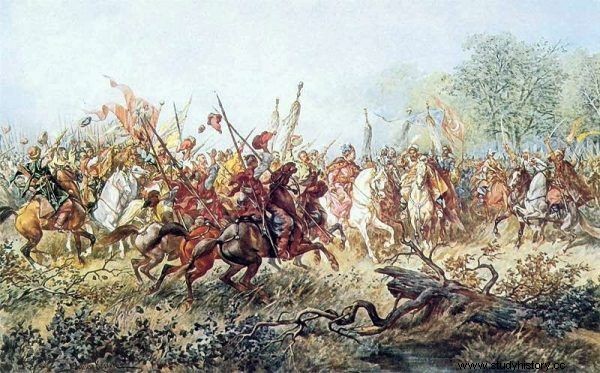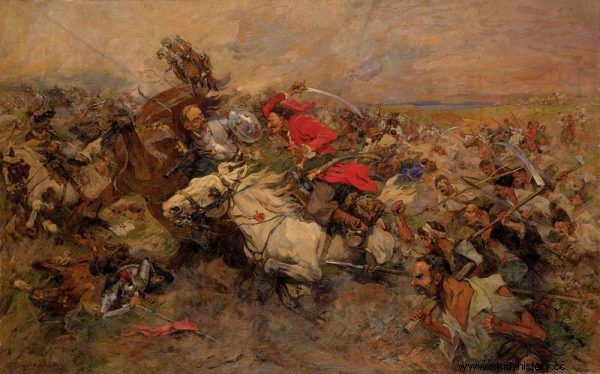Historians agree:the Grand Hetman of the Crown, Mikołaj Potocki, was a drunk who lost our chances in the battle with the Cossack army at Korsuń. Instead of caring about the fate of his homeland, he was drinking drunk and telling dirty jokes. Such a verdict was issued by contemporaries and it was remembered this way. Is it right?
It was 1648. The greatest Cossack uprising in the history of the Polish-Lithuanian Commonwealth was underway. The commander of the Polish army was the Grand Hetman of the Crown, Mikołaj Potocki, and his opponent was the ataman of the Cossack troops, Bohdan Chmielnicki. Potocki miserably lost the Battle of Korsuń, and the Polish army was completely destroyed. This event gave rise to a series of misfortunes that fell on the Commonwealth:from further problems with the Cossacks, through the war with Moscow, the Swedish Deluge, to the loss of importance of the state on the international arena.
In our historiography, the image of the great Hetman as an alcoholic, debauchee, arbitrary magnate, through whose deeds and neglect suffers the entire Republic . Was Mikołaj Potocki really pouring drinks into himself like one of our contemporary presidents? Should he be held solely responsible for the misfortunes that befell our homeland?
He talked more about the glasses than about the good of Rzeczpospolita ...
The eminent researcher of the Polish military, Jan Wimmer, in his book "The Polish Army in the Second Half of the 17th Century" had no doubts about it, repeating the hetman's black legend. Writing about 1648 he said authoritatively:
The crown army disorganized, poorly led by drunken Mikołaj Potocki at the same time devoid of any information about the opponent who avoided minor clashes to prevent taking prisoners ...

Grand Hetman of the Crown Mikołaj Potocki "Bear's Paw", Pilawa coat of arms. Was he really the only thing he thought about drinking and "male conversations" in the evening? (source:public domain).
Contemporary historians are beginning to notice that the negative assessment of Mikołaj Potocki is wrong. However, they still believe that by the campaign of 1648 he showed his incompetence. He is accused of alcoholism, sternness, haughtiness, disregard for the opponent .
To assess the truthfulness of the revelations repeated for centuries, let's reach for the sources. One of the diarists who recalled that Potocki commanded the army under the influence of alcoholic beverages was Joachim Jerlicz. He definitely blamed the queen for the defeat:
And it was thanks to the Chiefs, that is the Hetmans, Mikołaj Potocki, who advised more about glasses and glasses than about the good of Rzeczpslitej and the whole; jakoż he advised at night about brides or young wenches and good wives being alone in the old age of his old age, hating each other or advising his friend Marcin Kalinowski or others (...). Due to constant drunkenness and great fornication, he lost his army ...
The problem was that the diarist obtained second-hand information, wrote down rumors and gossip. Jerlicz had previously been attacked by the Cossacks and saved himself by escaping into the forest, barely escaping alive. Then he hid in the Kiev Monastery in Kiev. There he waited out the turmoil of war and could not be an eyewitness of the Hetman's then actions.
And the commander is sleeping drunk in a wheelchair…
It would seem that the information provided in the diary by Bogusław Maskiewicz, an experienced soldier associated with Jeremi Wiśniowiecki, is much more valuable. He wrote: And there was supposed to be a good devil's government, when Mr. Kraków, (...) Mikołaj Potocki constantly drank himself with booze, as he was sitting drunk in the coach at that time . Before the battle of Korsuń, Maskiewicz visited the Grand Hetman, so he could see something.

In the battle of Korsuń on May 26, 1648, the crown army suffered a crushing defeat. Although the opponent had a clear advantage in numbers, everyone was convinced that the main reason for the loss was Hetman Potocki's drunkenness. Painting by Juliusz Kossak, showing Chmielnicki's meeting with Tuhaj Bej near Korsun (source:public domain).
It is known, however, that as an envoy of Wiśniowiecki, he had to be welcomed, because Potocki wanted the duke to provide the fastest military meals possible. With such feasts there must have been some unpleasant conversations about "nice wives", and you can only describe it in a common way, because chivalrous fantasy knows no bounds.
However, all this happened in a safe place and time, and not during hostilities. It can be assumed that Maskiewicz described the impressions he had that day, linking them with the rumors circulating in Ukraine.
It is a very characteristic and popular painting by Mikołaj Potocki. The drunk queen was not able to move on his own, so he rode in a kolasa . It was, however, quite unusual, because during the battle of Corsun, the hetman, under the pressure of the enemy forces, ordered a retreat and determined the method of hauling the wagons. The horses were sheltered inside the rolling stock and all the people were to go on foot. Probably the queen himself.
Gout or alcoholism?
However, it cannot be completely ruled out that he moved in a carriage. But here too, the constant state of intoxication is not the only explanation. Mikołaj Potocki was seriously ill. He suffered from the ailments of most magnates of the time, resulting from an unhealthy lifestyle. The fact that he was constantly in a military camp itself had a negative impact on the hetman's condition.
Let us recall that old Stanisław Koniecpolski used to go to health resorts to repair his health, and Stanisław Żółkiewski, badly shot in the leg, which was more and more annoying to him with age, could not mount a horse and was constantly moving around in his carriage. The malicious ones could write about him, as in the case of Potocki, that he commanded the army from the carriage.

Did Bogusław Maskiewicz write about Potocki's drunkenness because he belonged to Jeremi Wiśniowiecki's supporters? Jarema himself desired the hetman's mace and certainly thought that he would be better in command of the crown army ... The illustration shows Juliusz Kossak's drawing "Prince Jeremi at the grave" (source:public domain).
A disease that persecuted the elite of that time, not sparing the Grand Hetman, was gout, manifested by acute arthritis. During the relapse, the patient was unable to get out of bed, and the pain was able to make the unfortunate man scream . The Grand Hetman struggled with these ailments even before the Battle of Kumejki in 1637, where he had to be helped into the carriage so that he could ride to the knight's wheel to convince unpaid soldiers for further service.
The symptoms of Potocki's ailments could resemble alcoholism, and thus it is not far to rumors about the hetman's drunkenness and commanding the army under the influence. Especially since Potocki had many powerful competitors jealous of power , respect and dignity, including Jeremy Wiśniowiecki himself.
It is known with certainty that the role of the hetman during the battles near Korsuń was not limited to lying in the vehicle inertly. This is evidenced by the wounds received. Potocki was cut three times with a saber, including once in the head.
Great Hetman, but forgotten
It is hard to resist the impression that the hetman's drunkenness is reflected in the accounts of people who did not participate directly in the hostilities, and who based their work on rumors and gossip, or were reluctant to Potocki and the faction gathered around him. It is worth paying attention to the reports submitted by the soldiers fighting at Korsun, very succinct and accurate. They say nothing about Potocki's boisterous behavior just before the battle.
For the average noble it was unimaginable that the Crown Army could succumb to the common peasants, for whom the insurgents were considered . Hence, various conjectures were made. During the hostilities, drunkenness in the army was forbidden, and the hetman had to set an example with his attitude. The soldiers quenched their thirst with beer, the alcoholic beverages had a reputation for preventive and curative agents, but excessive sanctions could be imposed for exaggeration.

The defeats suffered at the hands of Chmielnicki's army were beyond the minds of the Polish nobility. Consequently, a scapegoat had to be found. It fell on the Grand Hetman of the Crown, Mikołaj Potocki. The picture shows a painting by Mykola Samokysza (source:public domain).
It is also worth paying attention to a significant fact:when the Grand Hetman of the Crown, "incompetent, incompetent, alcoholic", was chained and taken into Turkish captivity, was there anyone to replace him with dignity? Any respected person who would bear the burden of defending the country on his shoulders?
Two years of Potocki's captivity was a period of pitiful defeats for the forces of the Republic of Poland. Despite the fact that the quartered army ceased to exist, hopes of calming the uprising were not dashed. Only the appointment of the three regimuments (according to Chmielnicki's contemptuous term:“feathers, Latin and childrens”) and the defeat at the Battle of Piławce, eliminated the chances of a quick calming down of the borderland.
The legend that hetman Potocki deceived the battle when drunk should be put among fairy tales. The defeat at Korsun was due to a number of factors that were not necessarily influenced by the chief . To understand the absurdity of the repeated version of events, it is enough to imagine a drunken Hetman riding in a coach through a dense forest among his bravely defending soldiers, surrounded on all sides by Cossacks and Tatars. Although perhaps Potocki, realizing the hopelessness of the situation, would then have to reach for a glass.
